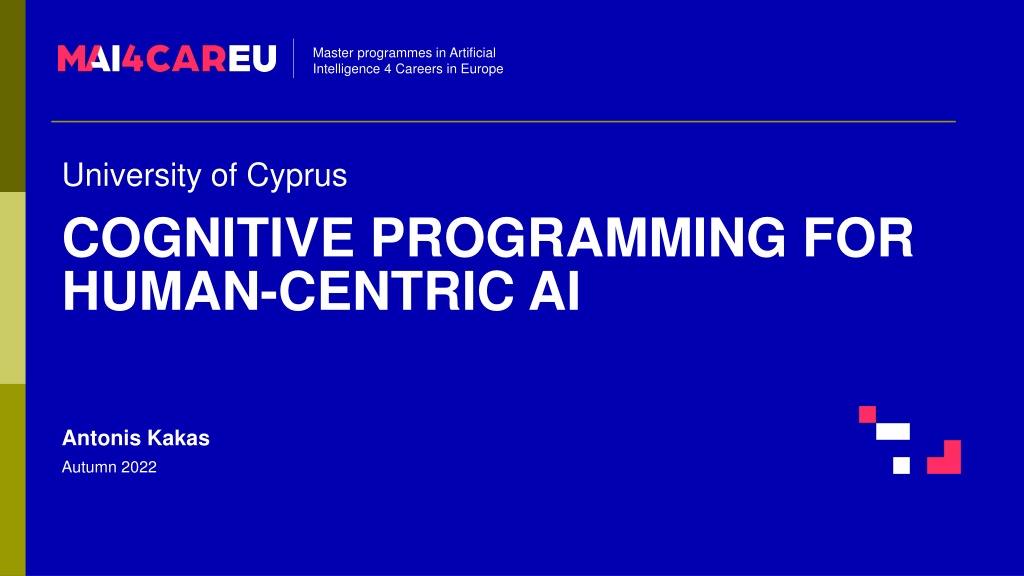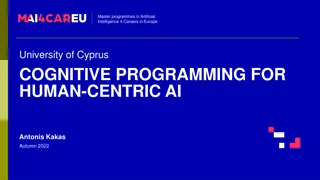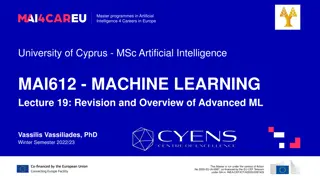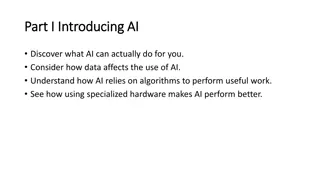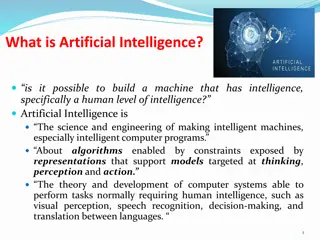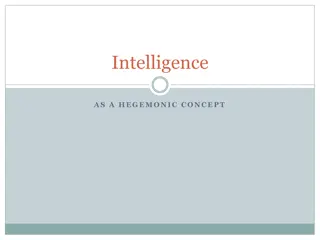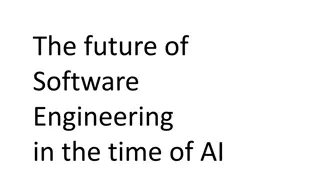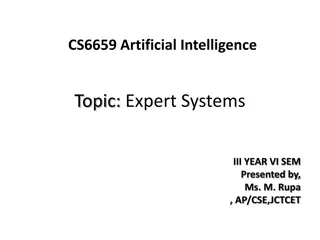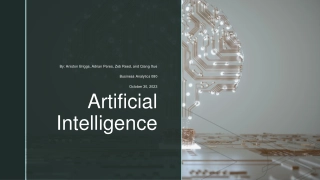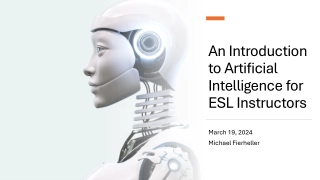Master Programmes in Artificial Intelligence for Human-Centric AI Careers
Explore the world of Cognitive Systems and Cognitive Programming for Human-Centric AI at the University of Cyprus. Delve into building systems that think and behave like humans, learn from experiences, and adapt to changing circumstances. Discover the ethical considerations of Cognitive Systems and their applications in AI. Learn the synthesis of Cognitive Psychology and AI to create ethical and efficient AI systems.
- Artificial Intelligence
- Cognitive Systems
- Human-Centric AI
- University of Cyprus
- Cognitive Programming
Download Presentation

Please find below an Image/Link to download the presentation.
The content on the website is provided AS IS for your information and personal use only. It may not be sold, licensed, or shared on other websites without obtaining consent from the author. Download presentation by click this link. If you encounter any issues during the download, it is possible that the publisher has removed the file from their server.
E N D
Presentation Transcript
Master programmes in Artificial Intelligence 4 Careers in Europe University of Cyprus COGNITIVE PROGRAMMING FOR HUMAN-CENTRIC AI Antonis Kakas Autumn 2022
Master programmes in Artificial Intelligence 4 Careers in Europe Lecture 1 Cognitive Systems 1. What is a Cognitive System? 2. How does it differ from Traditional Systems> 3. How can we build Cognitive Systems. 4. Ethical Requirement 2
Cognitive Systems What is a Cognitive System? One that thinks and behaves like a human. Gold Standard already exists: a Human 3
Cognitive Systems What is a Cognitive System? Systems that act on their own to achieve goals Perceive their Environment Anticipate the need to act/think Learn from Experience Adapt to changing circumstances Governed by ethical guidelines. 4
Cognitive Computing AI (From an IBM talk by K. Kokkikos) 5
Example of Cognitive System/Programming Cognitive On-line Shopping Assistant The quality of food is very important for me. I like to eat organic food. I am not diabetic but I like to avoid sugary foods. I prefer not to eat red meat except for special occasions. When possible try to economize. The fish last night was very good. I would have liked a bigger portion. 6
Cognitive Systems How do we build Cognitive Systems? Synthesis of Cognitive Psychology and AI Cognitive Psychology informs AI Read the EU document AI for Europe 7
Cognitive Systems How do WE build Cognitive Systems? Cognitive Argumentation Implements the Synthesis of Cognitive Psychology and AI within Computational Argumentation. 8
Cognitive Systems What is the main requirement of Cognitive Systems (AI systems more generally)? Ethical Operation/Behaviour Read the paper on the Moral Machine 9
Cognitive Systems Ethical Design Adhere to moral values Ethical decisions are context-sensitive One way: By respecting of norms: laws/regulations Again context sensitive Unavoidable moral dilemmas 10
Cognitive Systems Explainable AI Decisions/actions by AI systems need to be explainable Explainable AI - XAI Why? So that they can be ethical! 11
Argumentation for Ethics - Explainability Decisions of Actions are normally explained by appealing to the higher levels of moral values and/or norms to justify the decision Why did you not help the child? To protect myself (self_respect) Would be unlawful to hurt someone (obey norm) Why did you hurt the person? To defend myself (self_respect) To help the child in need (respect for the weak) Will come back to this norm-violating explanation 12
Argumentation for Ethics Explainability (2) Decisions of Actions are normally explained by appealing to the higher levels of moral values and/or norms to justify the decision Argumentation has explanation as a primary object: Explanation is the argument that supports the action Why did you hurt the person? To defend myself (self_respect) To help the child in need (respect for the weak) Will come back to this norm-violating explanation 13
Argumentation for Ethics Explainability (3) Decisions of Actions are normally explained by appealing to the higher levels of moral values and/or norms to justify the decision Furthermore, argumentation contains also dialectic information of counter-arguments and defenses (along with the initial supporting argument) Hence it can provide deeper explanations if requested, e.g. when decision is contested and an ensuing debate. Example: Hurt because: child was in immediate danger: there was no time to get help from police 14
Argumentation for Ethics Explainability (3) Decisions of Actions are normally explained by appealing to the higher levels of moral values and/or norms to justify the decision Furthermore, argumentation contains also dialectic information of counter-arguments and defenses (along with the initial supporting argument) Example: Why Hurt? To help the child in need Norm-violating explanation Deeper Explanation via Explication of the special context 15
Argumentation for Ethics Explainability (4) Argumentation can provide informed explanations and a supporting dialogue for users to analyze and possibly resolve their ethical dilemmas Cognitive Explanations of arg-based decisions Cognitive Experiments to evaluate this overall goal of arg-based ethics How do the explanations affect users decision? Do they change their mind/decision? Do the explanations and dialogue help users in their ethical decisions? What does help mean here? Follow moral guidelines??? 16
Master programmes in Artificial Intelligence 4 Careers in Europe This Master is run under the context of Action No 2020-EU-IA-0087, co-financed by the EU CEF Telecom under GA nr. INEA/CEF/ICT/A2020/2267423
